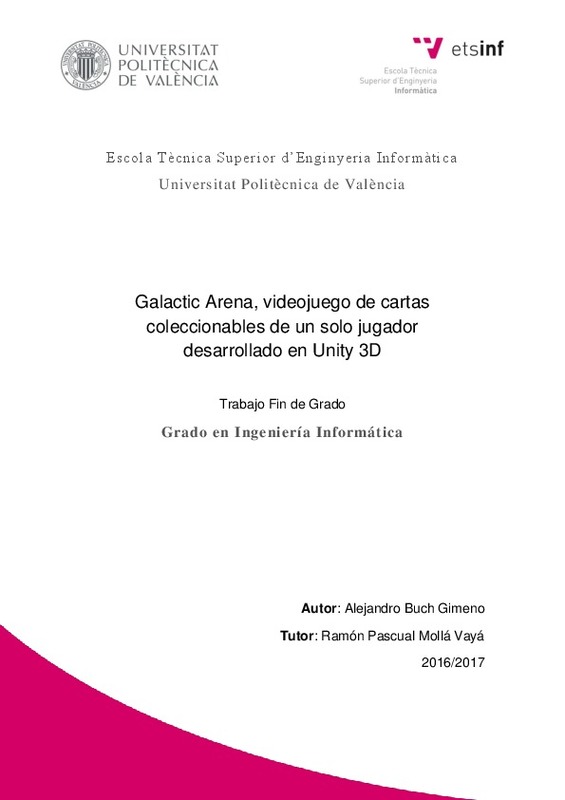JavaScript is disabled for your browser. Some features of this site may not work without it.
Buscar en RiuNet
Listar
Mi cuenta
Estadísticas
Ayuda RiuNet
Admin. UPV
Galactic Arena, videojuego de cartas coleccionables de un solo jugador desarrollado en Unity 3D
Mostrar el registro sencillo del ítem
Ficheros en el ítem
| dc.contributor.advisor | Mollá Vayá, Ramón Pascual
|
es_ES |
| dc.contributor.author | Buch Gimeno, Alejandro
|
es_ES |
| dc.date.accessioned | 2017-09-06T09:46:34Z | |
| dc.date.available | 2017-09-06T09:46:34Z | |
| dc.date.created | 2017-07-17 | |
| dc.date.issued | 2017-09-06 | es_ES |
| dc.identifier.uri | http://hdl.handle.net/10251/86538 | |
| dc.description.abstract | [ES] Este proyecto de fin de grado ha tenido la finalidad de desarrollar un videojuego de cartas coleccionables completamente funcional enfocado en la experiencia de un jugador individual. Esto es debido a que en el mercado, la inmensa mayoría de videojuegos de esta categoría están enfocados a la experiencia multijugador. Sin embargo, basta con realizar algo de investigación al respecto para darse cuenta de que hay un gran público que desearía poder disfrutar de campañas individuales, con historia de trasfondo, lo que se llama “el rol del juego”. Es aquí donde se vio una oportunidad de negocio desaprovechada suficiente como para motivar el desarrollo del mismo. El juego contiene un sistema de inteligencia artificial (IA) capaz de jugar con cualquier combinación de cartas de una forma desafiante, bases de datos cuyo formato es el documento de texto (esta decisión se analizará en profundidad más adelante), con sus respectivos parsers o lectores, una campaña individual y sesenta cartas diferentes con numerosos efectos de diferente índole para dotar al juego de estrategia. Todo ello, programado mediante el motor gráfico para videojuegos Unity 3D, proporcionado por Unity Technologies. La conclusión obtenida a la finalización del mismo, es que el videojuego podría, de publicarse, lograr atraer a ese público que ahora mismo no dispone de videojuegos específicamente desarrollados para su gusto. En cuanto al apartado técnico, se ha probado en profundidad la jugabilidad y el rendimiento de la IA y se ha llegado a la conclusión de que, si bien para un jugador experto podría llegar a resultar no muy difícil vencerla, por norma general es desafiante y presenta un grado de dificultad que anima a los jugadores a superarse a ellos mismos, lo que se considera muy satisfactorio para el atractivo del videojuego | es_ES |
| dc.description.abstract | [EN] Creation of an individual collectible card game in which, the player will combat against the artificial intelligence to advance through the adventure, unlocking new cards with each combat. A great part of the development has been centered on the creation of the artificial intelligence, as it is the most important part of the game. It had to be challenging, to entertain the player, but not so difficult that it will result in the player experiencing frustration. The combat turn works as described here: Each turn, the resource (Energy) is be incremented in one. This resource is consumed each turn to drop unit cards from the hand to the table. Once in the table, the cards will be able to attack other enemy cards or the enemy itself. If the enemy health reaches 0, you win. You lose if your health reaches 0. There is a second type of cards, the ability cards, which, on use, consume themselves instead of dropping to the table, giving different effects, such as instant damage, health, etc. After the combat, if you have won, you are awarded with random cards, which you will be able to include in your deck. The game features simple animations, sounds, a deck creator, and a translator, to change the language from english to spanish. It has been developed in Unity 3D, a powerful tool, prepared to develop many different types of games, including this one. | es_ES |
| dc.format.extent | 70 | es_ES |
| dc.language | Español | es_ES |
| dc.publisher | Universitat Politècnica de València | es_ES |
| dc.rights | Reconocimiento - No comercial - Compartir igual (by-nc-sa) | es_ES |
| dc.subject | Video Game | es_ES |
| dc.subject | Cards | es_ES |
| dc.subject | Artificial Intelligence | es_ES |
| dc.subject | Space | es_ES |
| dc.subject | Translator | es_ES |
| dc.subject | Videojuego | es_ES |
| dc.subject | Cartas | es_ES |
| dc.subject | Inteligencia Artificial | es_ES |
| dc.subject | Bases de Datos | es_ES |
| dc.subject | Sonido | es_ES |
| dc.subject | Interfaz de usuario | es_ES |
| dc.subject | Animación 2D | es_ES |
| dc.subject.classification | LENGUAJES Y SISTEMAS INFORMATICOS | es_ES |
| dc.subject.other | Grado en Ingeniería Informática-Grau en Enginyeria Informàtica | es_ES |
| dc.title | Galactic Arena, videojuego de cartas coleccionables de un solo jugador desarrollado en Unity 3D | es_ES |
| dc.type | Proyecto/Trabajo fin de carrera/grado | es_ES |
| dc.rights.accessRights | Abierto | es_ES |
| dc.contributor.affiliation | Universitat Politècnica de València. Escola Tècnica Superior d'Enginyeria Informàtica | es_ES |
| dc.contributor.affiliation | Universitat Politècnica de València. Departamento de Sistemas Informáticos y Computación - Departament de Sistemes Informàtics i Computació | es_ES |
| dc.description.bibliographicCitation | Buch Gimeno, A. (2017). Galactic Arena, videojuego de cartas coleccionables de un solo jugador desarrollado en Unity 3D. http://hdl.handle.net/10251/86538. | es_ES |
| dc.description.accrualMethod | TFGM | es_ES |
| dc.relation.pasarela | TFGM\62801 | es_ES |
Este ítem aparece en la(s) siguiente(s) colección(ones)
-
ETSINF - Trabajos académicos [5160]
Escola Tècnica Superior d'Enginyeria Informàtica






